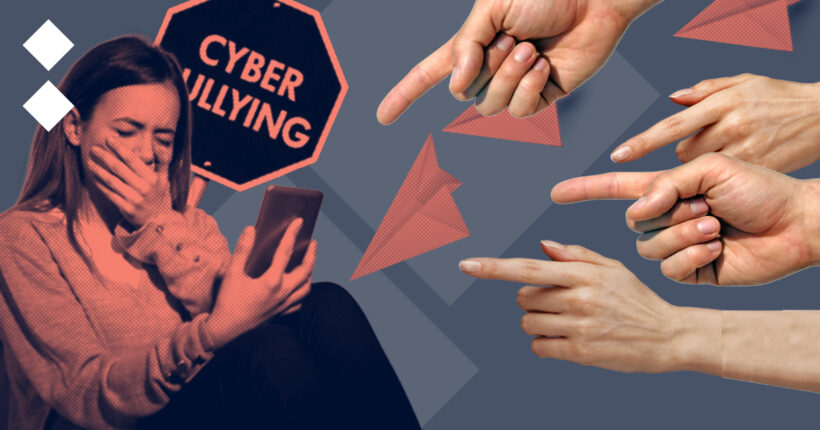
What is the problem?
Social media addiction or how teenagers deal with cyberbullying
According to the data of the UNICEF study "What are they like, Ukrainian teenagers: about social networks, sex, alcohol, sports, trust in parents and friends," 40% of teenagers communicate with close friends online during the day. One in six admits to having regular quarrels due to the use of social networks. The study also showed that every eighth teenager is addicted to social networks.
Young people see social networks as an opportunity to get rid of negative emotions, which makes them even more vulnerable. The situation worsens significantly in periodic quarantines and distance learning conditions because children spend even more time online.
A 2017 study by UNICEF shows that IDP children are more closed to communication and are bullied twice as often as others. They are vulnerable to the risks posed by information and communication technologies because they do not have adequate knowledge of Internet security rules and threats in the network.
In the study of the all-Ukrainian campaign against cyberbullying by Docudays UA, it is stated that as of April 1, 2020, courts have adopted 482 resolutions regarding bullying against children. In 13% of cases, cases related to cyberbullying, in particular threats, humiliating comments, and distribution of photos and videos without the child's consent.
What is the solution?
To understand the problem of cyberbullying in the community, to discuss it with schoolchildren, parents, and educators, to propose ways to counteract this phenomenon — this is the task Olha Kotok, a consultant of the Center for Professional Development of Pedagogical Workers of the Hoshcha Settlement Council and a teacher of the Rusyvelskyi Lyceum, has set herself. She opened the documentary film club Docudays UA Dovkil at the lyceum and initiated an advocacy project to prevent and counter cyberbullying in the community.
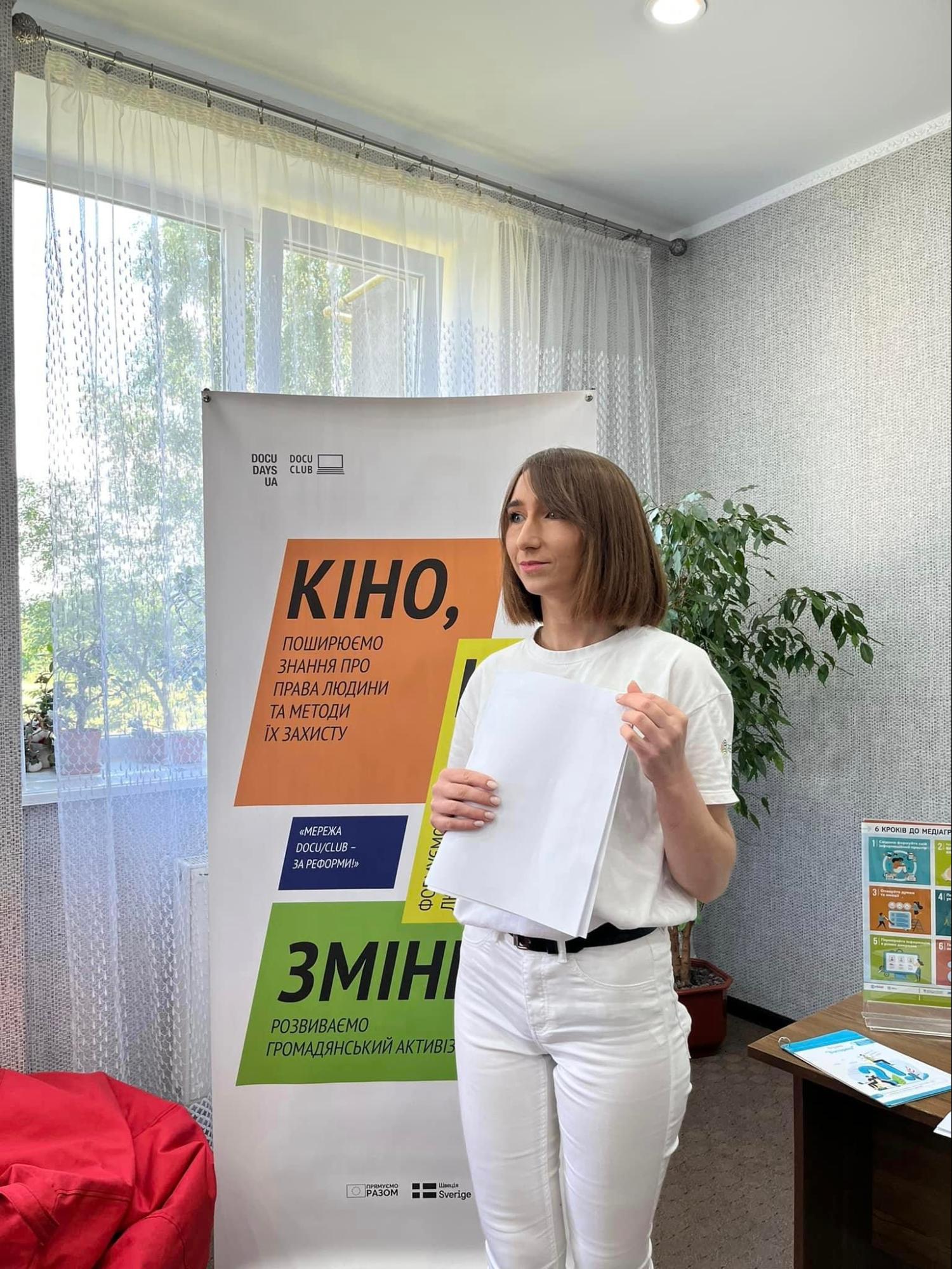
Olha Kotok, consultant of the Center for Professional Development of Pedagogical Workers of the Hoshcha Settlement Council and a teacher at the Rusyvelskyi Lyceum
During the full-scale invasion, 1,450 displaced people found shelter in the Hoshcha community, with a population of over 23,000 people. Some of them — 652 people — remained in the community, including children who were transferred to educational institutions of the community.
"Project management has recently been actively developing in our community. There are many trainings in various social fields. At the end of last year, I learned about the DOCU DOCU 2.0 project during training for educators," Kotok told Rubryka. "It was a mentoring training project for new film clubs from the DOCU/CLUB Network. We submitted an application, won the competition, and participated in this project. As the moderator of the film club, I went through a three-month high-quality training and started holding screenings and discussions of documentaries, creative classes, and games. Mentors supported us at all stages."
The Hoshcha community is small, and the townspeople interact closely with each other and the authorities. At first, Kotok held film screenings only at her lyceum, and later the movie club began to be invited to various outing events, for example, in the Hoshcha Center for after-school education.
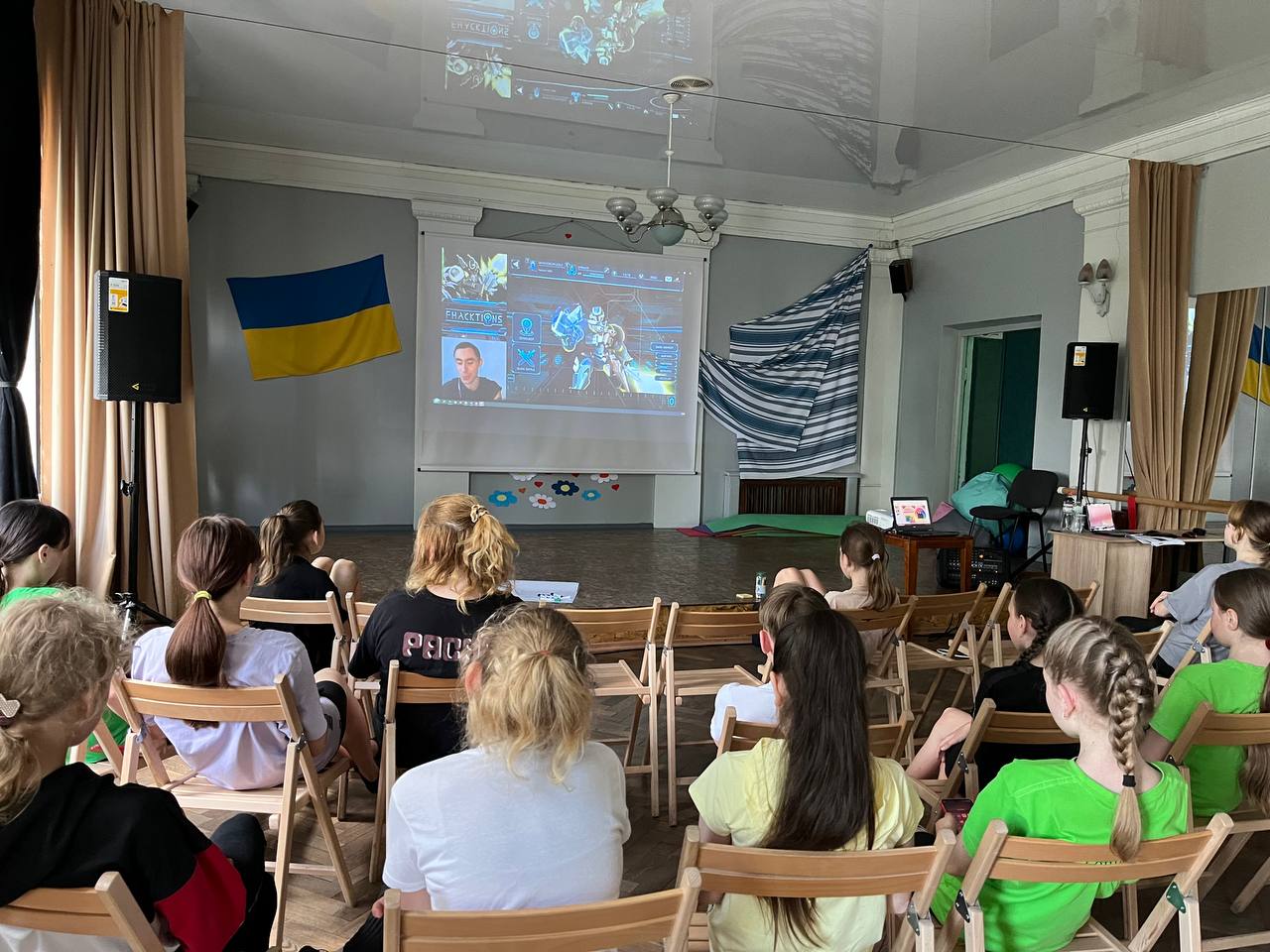
After watching the films, the club participants discuss these situations and share what impressed or affected them the most
Kotok shares that speaking with young people, she realized that the issue of cyberbullying and cyber security is of great concern to young people. There were many questions to which the teenagers could not find a clear answer.
"The reason for this may be that in wartime and distance education conditions, children spend more and more time on the Internet and, accordingly, more and more often encounter various dangerous situations on the Internet," Kotok explains. After watching the films, the club participants discuss these situations and share what impressed or affected them the most. Children receive useful information on how to protect themselves. This new knowledge and experience can prevent cyberbullying in the future.
How does it work?
Advocacy of socially important projects in the community
Educators, with the support of the DOCU/CLUB Network team, began to implement the advocacy project Educational Environment without Cyberbullying: reboot. The issue of cyberbullying has been raised in the community before, but now it is worth updating the approach to the topic, thinking of activities that will be interesting to schoolchildren and educators, and generally updating the community's understanding of this problem.
During the implementation of the project, Kotok's team involved various experts. It worked with students, with the teaching staff of two educational institutions — the Rusyvelskyi Lyceum and the Hoshcha Center for Extracurricular Education.
"During these events, we were struck by how important it is for children to be included in developing recommendations and understand that they have the right to vote. At the end of the project, we prepared an appeal to the education department, offering to review measures to combat cyberbullying," says Kotok.
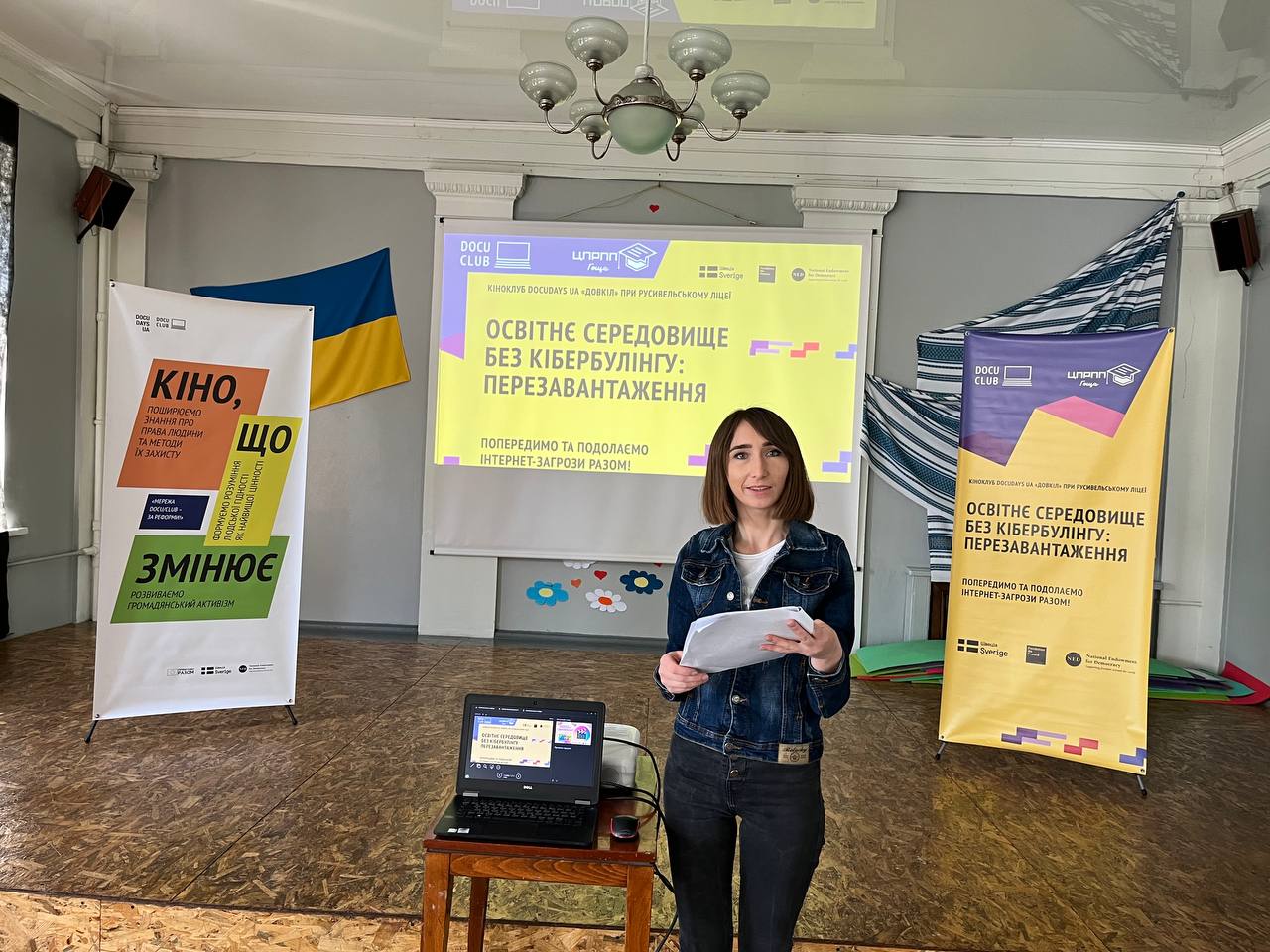
Kotok is sure that if there is an understanding of this phenomenon, and its types, perhaps even the bullies will think about the consequences that may await them
Kotok is sure that if there is an understanding of this phenomenon, and its types, perhaps even the bullies will think about the consequences that may await them
Educators offered to conduct educational seminars and trainings for psychologists, social pedagogues, and, if possible, for class teachers about the dangers of cyberbullying and how to combat it. Another suggestion from educators is to tell children in an easy-to-understand format what to do if they witness or are the target of cyberbullying. Educators also recommended opening new documentary film clubs and spreading knowledge about the DOCU/CLUB Network and its opportunities in general.
Kotok says that children in the community have a general idea of cyberbullying. Still, it was difficult for them to explain in detail what this means and the consequences of cyberbullying. Therefore, in addition to film screenings, discussions were held on cyberbullying-related topics in the community, and experts in media literacy and combating this phenomenon were involved. After the discussions, the children already understood what to do in a specific situation.
Kotok is sure that if there is an understanding of this phenomenon, and its types, perhaps even the bullies will think about the consequences that may await them. They might understand that their crime can be recorded and proven and realize that the guilty will be punished. "When bullies know that all this is controlled by law, I think it will definitely prevent cyberbullying," Kotok told Rubryka.
"Watching a documentary makes it easier to discuss important and complex topics"
Documentary cinema helps shape the worldview of teenagers, Kotok believes. This is an interesting and special experience for young people because it simplifies the discussion of significant and complex topics. In addition, watching movies can be easily integrated into the educational process. With the help of films, you can arouse emotions in the audience, encourage them to think and discuss. This is how students learn to translate their feelings into a live, proper discussion where everyone's opinion should be heard.
According to the children's observations, they encountered certain elements of cyberbullying, although they did not understand it. "I often heard from them: 'Oh, I know about this, and in our group, there was such a thing, and once I also saw something like that,'" Kotok shares. "They did not even think about it and did not guess that it could be a manifestation of cyberbullying. They simply thought that everything was normal, everything should be like that, there are no problems with this."
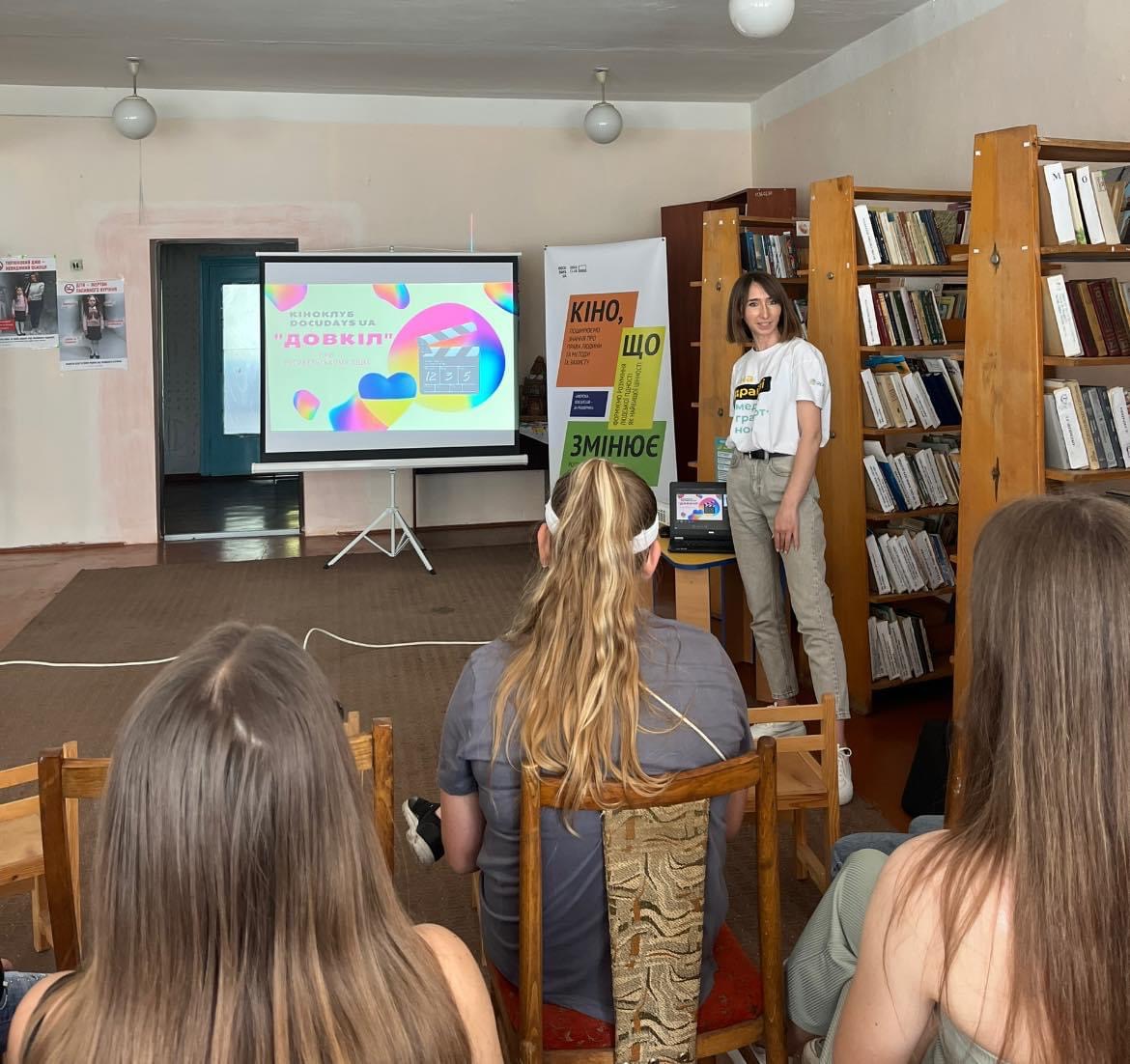
The Dovkil film club has already started cooperating with the club institutions of the Hoshcha community
Sometimes people start solving a problem when it already exists instead of working to avoid it. The film club team is convinced that it is worth working on preventing cyberbullying.
"Our slogan is 'Let's prevent and overcome Internet threats together.' If there are cases of cyberbullying, the children will already know what to do in this situation, who to turn to for help, where to call, where to find this or that necessary information," adds Kotok.
"She's not breathing"
During the screenings, as part of the project, the students watched the French film Swatted about swatting — one of the types of cyberbullying. The film's events unfold through videos on YouTube and recordings of real footage from online games. The director of the film is Ismaël Joffroy Chandoutis.
Children's reaction to the film was different. According to Kotok, they often said that this would definitely not happen to them, and during the discussion, they thought about it and changed their minds. Most of the children were struck by the fact that such a situation could actually happen in real life.
The movie begins with the phrase, "I shot my mother, and she's not breathing." A swatter, a cyberbully, speaks this phrase. Children are mortified to realize their peers are falling prey to such cruel and dangerous online pranks. There is always silence in the audience, and children begin to think about how they spend time on the Internet and communicate with their parents. "I also want to note the reaction of adults to the film. I think it impressed them even more. Before watching the film, many adults had no idea what their children were doing on the Internet, what games they were playing, and who could be watching them while playing," Kotok shared with Rubryka.
The Dovkil film club has already started cooperating with the club institutions of the Hoshcha community. In June alone, educators made eight outing documentary screenings. In July and August, they signed a Memorandum with the youth space Klubok, and in the fall, they will introduce documentary cinema into the community's educational process.
Newsletter
Digest of the most interesting news: just about the main thing








